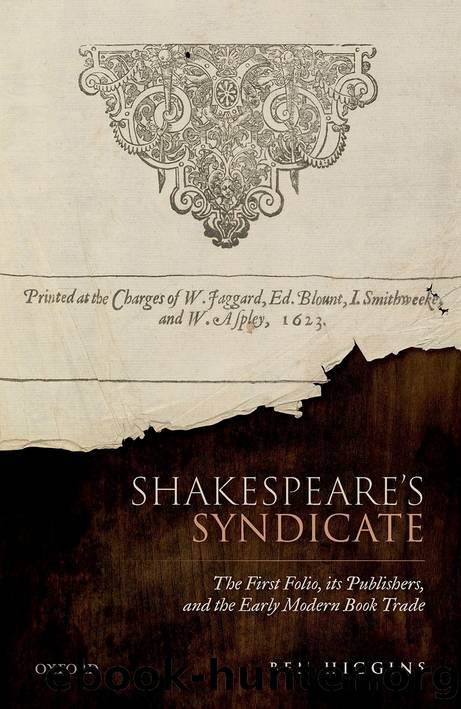Shakespeare's Syndicate by Ben Higgins;

Author:Ben Higgins; [Higgins, Ben]
Language: eng
Format: epub
ISBN: 9780192665195
Publisher: OUP Premium
Published: 2022-01-25T00:00:00+00:00
To call Aspley a minor Shakespearean places him in a group of stationers whose individual significance is far outweighed by their collective influence. More so than any individual, it was this broad community of stationers who fostered the dynamism of the market for these books, creating an ecosystem of competition and collaboration which shaped the vibrant history of Shakespearean literary identity.
Place of much dissimulation: the Church
(the Church)
( )
â The Malcontent (1604)
After a decade of explorative publishing, Aspley began to change his habits. Once established he was free to pursue his own interests beyond Shakespeare or early modern drama. From about 1608, his strategy of collaborating with stationers on a variety of genres faded away as he found the rhythm that would define his career. This change of heart, which moved him away from Shakespeare and towards religious publishing, may also have been prompted by Aspleyâs pursuit of topical texts, several of which fell foul of censors in ways that the stationer perhaps felt were unsustainable. The scattering of plays Aspley published at the start of his career illustrates his misadventures. The quarto edition of 2 Henry IV, for example, survives in two different issues, only one of which includes what is now Act 3 Scene 1. This scene focuses on two speeches by King Henry, in both of which he frets over the rebellion gripping his kingdom and recalls the usurpation of Richard II. â[Y]ou perceive the body of our kingdomâ, the king tells his noblemen, âHow foul it is, what rank diseases grow.â35 The political nature of the scene, and in particular its focus on a moment of usurpation and successionâsensitive issues at the end of Queen Elizabethâs reignâhave led some scholars to suggest that censorship lies behind these changes. There are similar issues with Aspleyâs next play, Thomas Dekkerâs Old Fortunatas (1600), many copies of which have had an offending leaf removed from the middle of the book.36
Likewise the copies of John Marstonâs play The Malcontent, which Aspley published in 1604, are âparticularly tangledâ by a series of crude and panicky alterations.37 Not least of these are the changes made to an offending line in Act 1 Scene 3 in which the scheming character Malevole described âthe publike place of much dissimulation, (the Church)â.38 The line survives in at least three states. The most immediate and jarring alteration saw the offending noun âChurchâ neatly sliced out of the pageâprobably by Aspley or at his direction, given that the same cuts feature in multiple copiesâwith a number of disorientating consequences. The cuts were made on the verso side of the leaf, which means that a reader first encounters them on the previous recto, where they emerge beside a stage direction for the entrance of several characters. The arrival of Duke Pietro, Ferrardo, and Count Equato is therefore troubled by the uneasy possibility of a further excised presence. Turn the page, though, and in some states the hole allows text from the playâs induction to jump into a new frame of meaning within the play.
Download
This site does not store any files on its server. We only index and link to content provided by other sites. Please contact the content providers to delete copyright contents if any and email us, we'll remove relevant links or contents immediately.
| Books & Reading | Comparative Literature |
| Criticism & Theory | Genres & Styles |
| Movements & Periods | Reference |
| Regional & Cultural | Women Authors |
4 3 2 1: A Novel by Paul Auster(11788)
The handmaid's tale by Margaret Atwood(7447)
Giovanni's Room by James Baldwin(6808)
Asking the Right Questions: A Guide to Critical Thinking by M. Neil Browne & Stuart M. Keeley(5355)
Big Magic: Creative Living Beyond Fear by Elizabeth Gilbert(5351)
Ego Is the Enemy by Ryan Holiday(4956)
On Writing A Memoir of the Craft by Stephen King(4662)
The Body: A Guide for Occupants by Bill Bryson(4580)
Ken Follett - World without end by Ken Follett(4443)
Bluets by Maggie Nelson(4260)
Adulting by Kelly Williams Brown(4232)
Eat That Frog! by Brian Tracy(4149)
Guilty Pleasures by Laurell K Hamilton(4116)
White Noise - A Novel by Don DeLillo(3829)
The Poetry of Pablo Neruda by Pablo Neruda(3814)
Fingerprints of the Gods by Graham Hancock(3733)
Alive: The Story of the Andes Survivors by Piers Paul Read(3730)
The Book of Joy by Dalai Lama(3695)
The Bookshop by Penelope Fitzgerald(3619)
